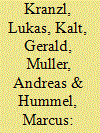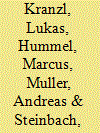| Srl | Item |
| 1 |
ID:
125389


|
|
|
|
|
| Publication |
2013.
|
| Summary/Abstract |
The heating sector has been neglected in energy policies for quite some time, especially on the European level. Only recently, with the implementation of the European directive 2009/28/EC the sector has gained higher attention. The objective of this paper is to provide an overview of the heat market in Austria and of the current status and future prospects of renewable energy in the heat sector (RES-H) up to 2030. Despite the growing energy demand, the share of renewable energy in the total energy demand for space heating and hot water increased from about 20% in 1970 to about 34% in 2008. This is mainly due to ambitious RES-H support instruments and regional policy targets. For example, the government of the region of Upper Austria has implemented a target of 100% RES-H share in the space heating and hot water sector until the year 2030. However, the National Renewable Energy Action Plan for 2020 foresees only moderate growth rates for RES-H compared to recent market growth and scenarios in literature. Due to the ambitious targets and support schemes of regional governments it seems likely that RES-H deployment could growstronger than stated in the action plan.
|
|
|
|
|
|
|
|
|
|
|
|
|
|
|
|
| 2 |
ID:
125392


|
|
|
|
|
| Publication |
2013.
|
| Summary/Abstract |
In the light of the EU directive for renewable energy (2009/28/EC) this paper deals with the question how various policy instruments could impact the development of renewable heating technologies. The paper applies the simulation model Invert/EE-Lab for the building related heat demand in selected European countries (Austria, Lithuania and United Kingdom). The resulting scenarios up to 2030 are compared to RES-Heat targets from literature, stakeholder consultation processes and the targets in the national renewable energy action plans submitted by EU Member States in 2010. The results demonstrate that use obligations for renewable heating can be effective in achieving RES-Heat market growth. However, in order to attain a balanced technology mix and more ambitious targets, policy packages are required combining use obligations with economic incentives and accompanying measures. Technology specific conclusions are derived. Moreover, conclusions indicate that the action plans are not always consistent with policy measures in place or under discussion.
|
|
|
|
|
|
|
|
|
|
|
|
|
|
|
|
| 3 |
ID:
109357


|
|
|
|
|
| Publication |
2011.
|
| Summary/Abstract |
This paper investigates the effects of policy, fuel prices and technological progress on the Austrian passenger car fleet in terms of energy consumption and greenhouse gas (GHG) emissions. To analyse these effects a simulation model is used. We model the car fleet from a bottom-up perspective, with a detailed coverage of vehicle specifications and propulsion technologies. The model focuses on the technological trend toward electrified propulsion systems and their potential effects on the fleet's energy consumption and GHG emissions. To represent the impact of prices and income on the development of the fleet, we combine the fleet model with top-down demand models.
We developed two scenarios for the time frame 2010-2050, using two different sets of assumptions for regulatory development and conditions of increasing fossil fuel prices and continuous technological progress in vehicle propulsion technologies.
The results indicate that material cuts in energy consumption and GHG emissions can be achieved with changes to the political framework for passenger cars. Appropriate taxation of fuels and cars can stabilise demand for individual motorised transport and lead to an improvement in vehicle efficiency by fostering the adoption of efficient vehicle propulsion technologies and low carbon fuels.
|
|
|
|
|
|
|
|
|
|
|
|
|
|
|
|